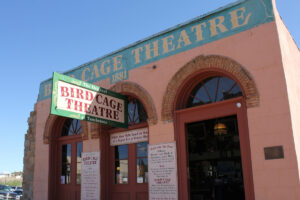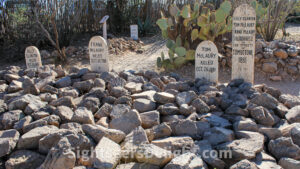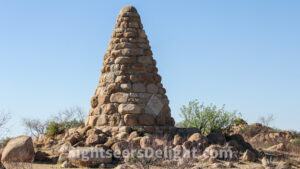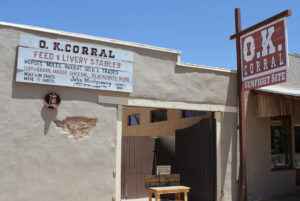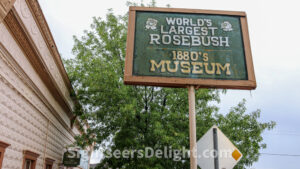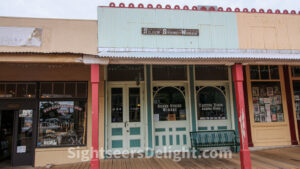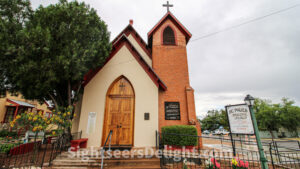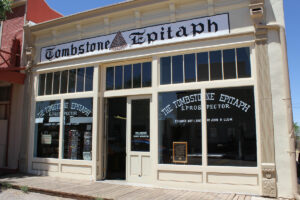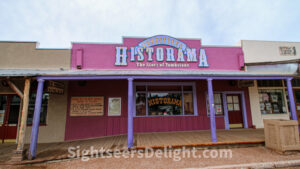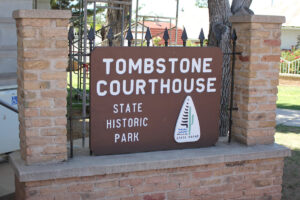The Bird Cage Theatre was a theater, saloon, gambling parlor and brothel. It operated from 1881 to 1889. Of the theatre, someone once called it “the wildest, wickedest night spot between Basin Street and the Barbary Coast.” Stepping into this said-to-be-haunted theater is like stepping into a time machine. When the establishment close in 1889, its doors were sealed until 1934. The old theater remains riddled with bullet holes. One of the more interesting artifacts is a poker table that hosted a game that allegedly lasted for more than eight years, five months and three days. Doc Holliday (the legendary dentist) and Adolphus Busch (who created some beer or something) were among the famous people who participated in the game.
85638
Tombstone opened the “City Cemetery” in 1878. The site is the final resting place of at least 250 people. The cemetery, later called the “Old City Cemetery,” didn’t pick up its current name, “Boothill Graveyard” until about 1929, when the town first hosted Helldorado Days. Its permanent residents include three men — Billy Clanton, Frank McLaury and Tom McLaury — gunned down during the now-infamous Gunfight at the O.K. Corral. By the 1920s, the cemetery was in dire need of restoration. Now restored, the cemetery is one of the city’s main tourist destinations, in part because of its sometimes humorous epitaphs.
85638
As Ed Schieffelin started prospecting for valuable minerals in southern Arizona during the latter half of the 1870s, his friends insisted he would only find his tombstone. They were wrong. Instead, he discovered silver in an area that would grow into one of the most colorful towns in the country’s history: Tombstone. Over the years, mines in Tombstone produced $85 million in silver. Schieffelin died in Oregon on May 12, 1897, but he insisted his final resting spot be in Tombstone. A 25-foot-tall monument stands atop his burial site and near the location of his original claim.
85638
The Gunfight at the O.K. Corral is arguably the most famous shootout in American history. The 30-second firefight took place at 3 p.m. on Wednesday, Oct. 26, 1881, near the O.K. Corral. But since the name Gunfight at the O.K. Corral sounds better than Gunfight at the narrow lot near C. S. Fly’s Photographic Studio on Fremont Street, the name stuck. The O.K. Corral was a livery and horse corral that operated from 1879 until about 1888. The name slip doesn’t stop hordes of tourists from converging on the OK Corral for reenactments that may or may not use a few lines from the famous film sharing a name with the town.
85638
The Rose Tree Museum opened in 1964 inside a former hotel in downtown Tombstone. The museum showcases a different side of history in the mining town, one that doesn’t include a famous gunfight. But the real highlight is the World’s Largest Rose Bush. According to various sources, Mary Gee, a homesick woman from Scotland, planted the Lady Banksia rose tree in 1885. By the 1930s, the bush claimed the title of world’s largest. The building itself was the first adobe structure built in Tombstone. The Visina Mining Co. built the structure as an employee lodging house. It was later the Cochise House and the Arcade Hotel before assuming the name of Rose Tree Inn in 1935.
85635
At first glance, Silver Strike Winery and Tasting Room might seem out of place in the rough-and-tumble town of Tombstone. After all, the winery sits just mere steps from the famous OK Corral. No matter, the winery is a welcome respite from the cowboys, gunfights and tourists that clog the city’s streets. The winery, which opened in November 2011, features wines made with Mediterranean grape varietals originating in Italy, France, Germany, Spain and Portugal grown at vineyards located 50 miles east and west of Tombstone.
85638
While many of the historical sites around Tombstone are not original to the days when Wyatt Earp and Doc Holliday wandered the dusty streets of Tombstone, nearly every aspect of St. Paul’s Episcopal Church dates to 1882 when the church opened. Rev. Talbot and the Arizona-New Mexico Episcopal Diocese began construction of the church, and Endicott Peabody completed it in June 1882. The church, located at Safford and Third streets, cost $5,000. While many businesses in town closed over the years, St. Paul’s Episcopal Church did not, surviving the town’s leaner times. It continues to hold weekly services.
85638
The Tombstone Epitaph is perhaps the most revered institution in Tombstone, Arizona. John P. Clum founded the newspaper in 1880, and today, it is the oldest continuously published newspaper in the Grand Canyon State. Since the town was name Tombstone and “every Tombstone needs an epitaph,” as Clum would later say, the newspaper had its name. The publication witnessed history, when, in 1881, it reported on the now-infamous Shootout at the OK Corral. Today, the paper is a monthly journal of western history. Students at the University of Arizona continue to publish a local edition of The Tombstone Epitaph. The newspaper office in Tombstone is a museum about its role in the community.
85638
Tombstone’s Historama offers a historically accurate multimedia account of the history of Tombstone. It features the town’s story from the days of Geronimo’s Apaches to the more recent times and, of course, includes information about the Gunfight at the O.K. Corral. The 25-minute show, narrated by actor Vincent Price, also highlights the fires that devastated the community and the flooding that ultimately spelled the end for Tombstone’s mines, making it a helpful overview for anyone looking for more about the backstory of the “Town Too Tough to Die.” Admission to Tombstone’s Historama in included with a ticket to the O.K. Corral.
85638
There are two versions of Tombstone. The first is the stuff of legends. The second is the real history, which while entertaining and almost unbelievable, is a little less grandiose. For anyone especially interested in learning the full story of Tombstone, a visit to the Tombstone Courthouse is an absolute must. Cochise County built the courthouse in 1882 for administrators of the then-newly created Cochise County. It remained in use until 1929, when the county seat relocated to Bisbee. After its abandonment, proprietors planned to repurpose the courthouse as a hotel, but today the courthouse houses a museum dedicated to telling the historically accurate story of Tombstone.
85638

